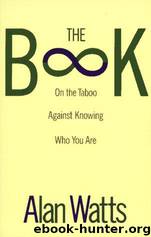The Book: On the Taboo Against Knowing Who You Are by Alan Watts

Author:Alan Watts [Watts, Alan]
Language: eng
Format: epub, azw3, mobi
Tags: Self-knowledge; Theory of, Eastern, Self, Philosophy, Humanism, General, Religion, Buddhism, Self-Help, Personal Growth, Fiction, Movements
ISBN: 9780679723004
Publisher: Vintage Books
Published: 1989-08-28T10:00:00+00:00
In times past, recognition of the impermanence of the world usually led to withdrawal. On the one hand, ascetics, monks, and hermits tried to exorcise their desires so as to regard the world with benign resignation, or to draw back and back into the depths of consciousness to become one with the Self in its unmanifest state of eternal serenity.
On the other hand, others felt that the world was a state of probation where material goods were to be used in a spirit of stewardship, as loans from the Almighty, and where the main work of life is loving devotion to God and to man.
Yet both these responses are based on the initial supposition that the individual is the separate ego, and because this supposition is the work of a double-bind any task undertaken on this basis—including religion—will be self-defeating. Just because it is a hoax from the beginning, the personal ego can make only a phony response to life. For the world is an ever-elusive and ever-disappointing mirage only from the standpoint of someone standing aside from it—as if it were quite other than himself—and then trying to grasp it. Without birth and death, and without the perpetual transmutation of all forms of life, the world would be static, rhythmless, undancing, mummified.
But a third response is possible. Not withdrawal, not stewardship on the hypothesis of a future reward, but the fullest collaboration with the world as a harmonious system of contained conflicts—based on the realization that the only real "I" is the whole endless process. This realization is already in us in the sense that our bodies know it, our bones and nerves and sense-organs. We do not know it only in the sense that the thin ray of conscious attention has been taught to ignore it, and taught so thoroughly that we are very genuine fakes indeed.
(1) "Until the middle of the 17th century Chinese and European scientific theories were about on a par, and only thereafter did European thought begin to move ahead so rapidly. But though it marched under the banner of Cartesian-Newtonian mechanicism, that viewpoint could not permanently suffice for the needs of science—
the time came when it was imperative to look upon physics as the study of the smaller organisms, and biology as the study of the larger organisms. When the time came, Europe (or rather; by then, the world) was able to draw upon a mode of thinking very old, very wise, and not characteristically European at all." Needham, Science and Civilisation in China. Cambridge University Press, 1956. Vol. II, p. 303.
Download
The Book: On the Taboo Against Knowing Who You Are by Alan Watts.epub
The Book: On the Taboo Against Knowing Who You Are by Alan Watts.azw3
The Book: On the Taboo Against Knowing Who You Are by Alan Watts.mobi
This site does not store any files on its server. We only index and link to content provided by other sites. Please contact the content providers to delete copyright contents if any and email us, we'll remove relevant links or contents immediately.
| Deconstruction | Existentialism |
| Humanism | Phenomenology |
| Pragmatism | Rationalism |
| Structuralism | Transcendentalism |
| Utilitarianism |
The remains of the day by Kazuo Ishiguro(8969)
Tools of Titans by Timothy Ferriss(8363)
Giovanni's Room by James Baldwin(7325)
The Black Swan by Nassim Nicholas Taleb(7106)
Inner Engineering: A Yogi's Guide to Joy by Sadhguru(6785)
The Way of Zen by Alan W. Watts(6600)
Asking the Right Questions: A Guide to Critical Thinking by M. Neil Browne & Stuart M. Keeley(5757)
The Power of Now: A Guide to Spiritual Enlightenment by Eckhart Tolle(5748)
The Six Wives Of Henry VIII (WOMEN IN HISTORY) by Fraser Antonia(5496)
Astrophysics for People in a Hurry by Neil DeGrasse Tyson(5182)
Housekeeping by Marilynne Robinson(4436)
12 Rules for Life by Jordan B. Peterson(4299)
Double Down (Diary of a Wimpy Kid Book 11) by Jeff Kinney(4261)
Ikigai by Héctor García & Francesc Miralles(4246)
The Ethical Slut by Janet W. Hardy(4242)
Skin in the Game by Nassim Nicholas Taleb(4237)
The Art of Happiness by The Dalai Lama(4125)
Skin in the Game: Hidden Asymmetries in Daily Life by Nassim Nicholas Taleb(3987)
Walking by Henry David Thoreau(3952)
